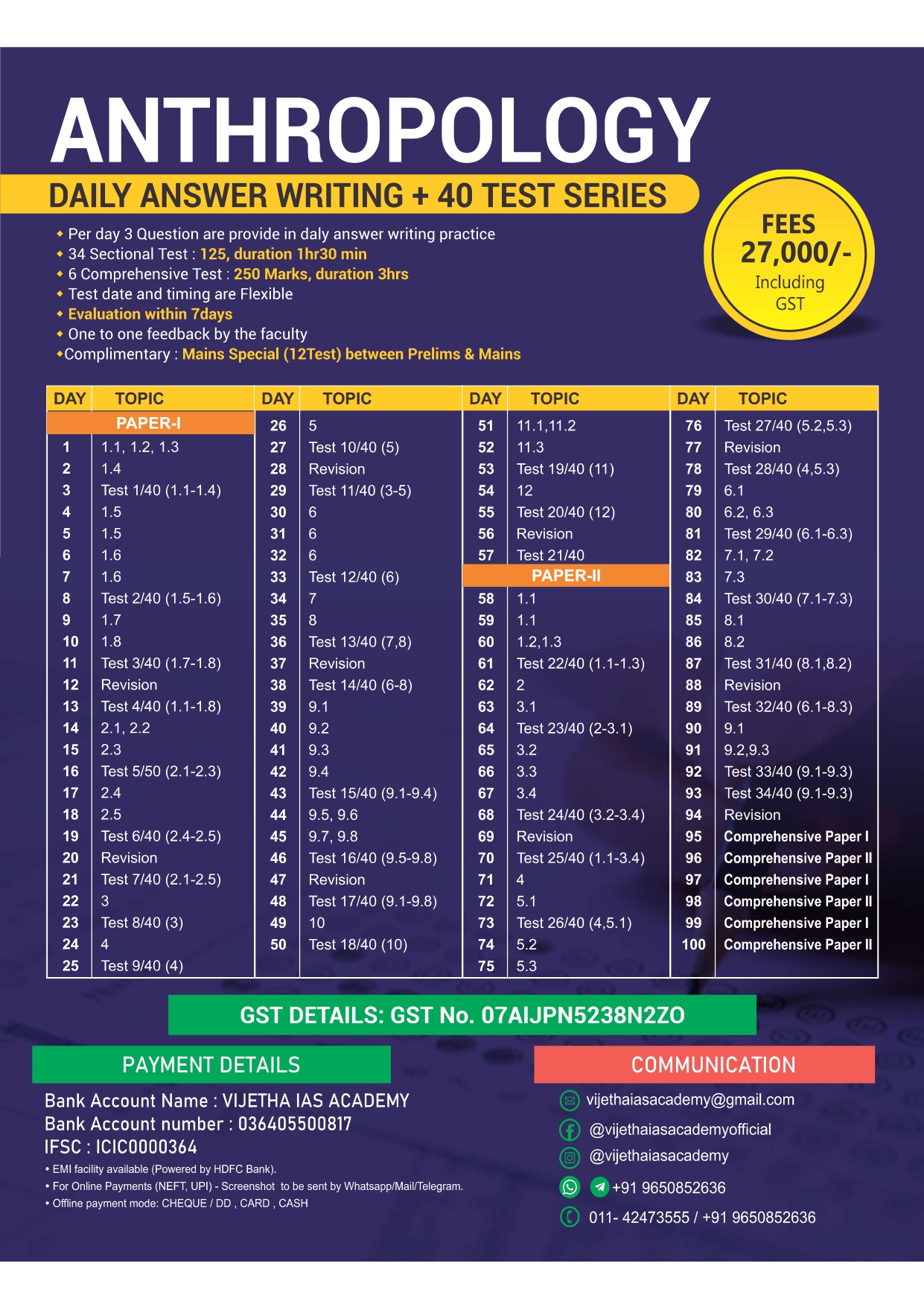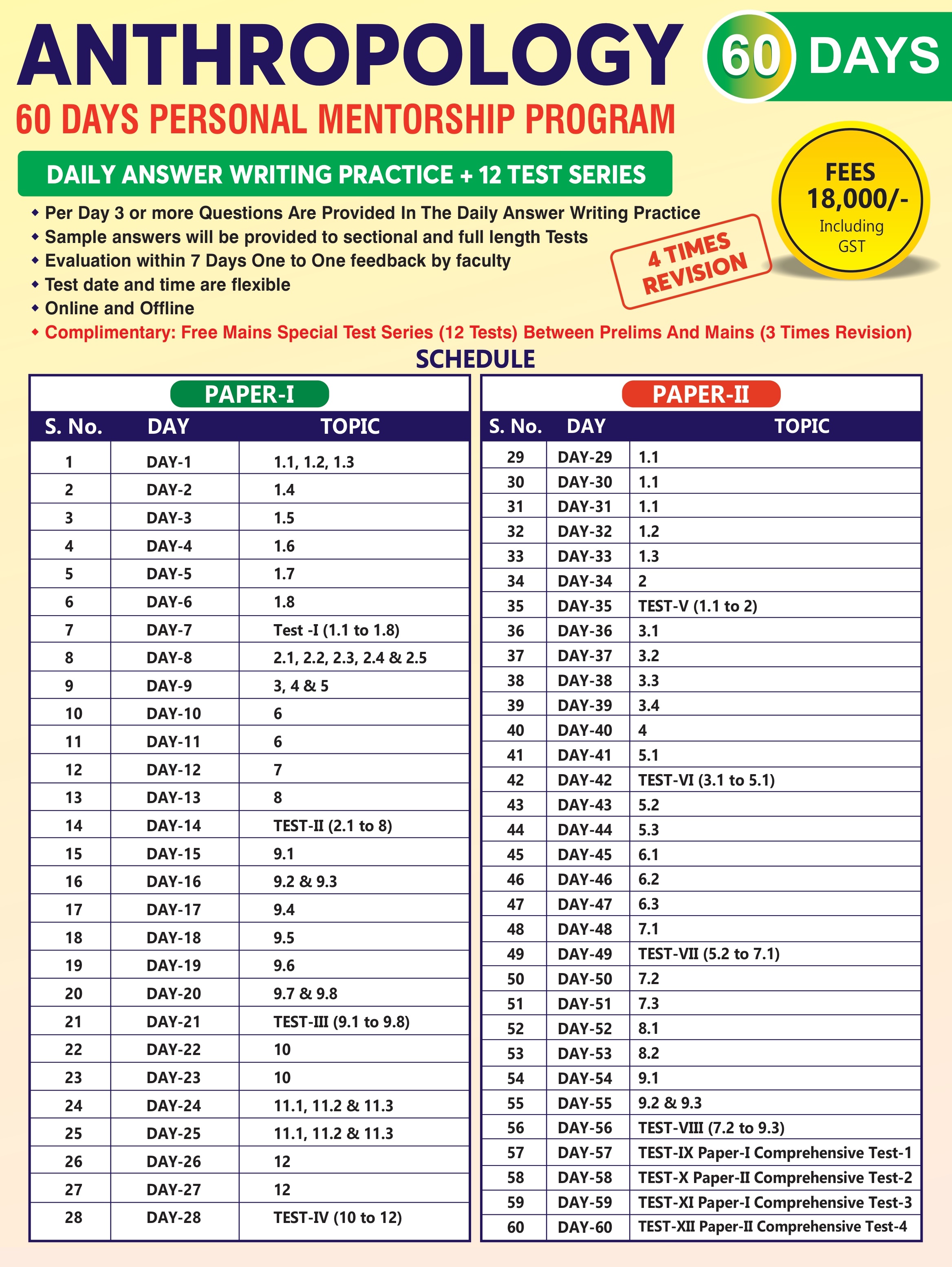Critically examine existing paradigms of holistic health for the marginalised sections of society drawing inferences from COVID-19 pandemic. (20 Marks) Anthropology Optional Paper CSE 2024
Critically examine existing paradigms of holistic health for the marginalised sections of society drawing inferences from COVID-19 pandemic. (20 Marks) Anthropology Optional Paper CSE 2024
-
Author : Vijetha IAS
-
Date : {{ formatDate("Wed Oct 02 2024 14:58:10 GMT+0530 (India Standard Time)") }}
-
Category : Daily article, Daily News,

Critically examine existing paradigms of holistic health for the marginalised sections of society drawing inferences from COVID-19 pandemic.
(20 Marks) Anthropology Optional Paper CSE 2024
Introduction
The COVID-19 pandemic exposed deep-seated inequalities in health systems globally, disproportionately affecting marginalized sections of society, including tribal populations, economically disadvantaged groups, and racial minorities. The crisis highlighted the need for holistic health approaches, which encompass not just physical health but also mental, social, and environmental well-being. Traditional paradigms of healthcare often fail to adequately address the complex needs of marginalized communities, raising critical questions about the inclusivity and effectiveness of existing health systems in promoting equitable health outcomes.
Main Body
Traditional Paradigms of Holistic Health:
Biomedical Model:
The dominant paradigm in global health focuses primarily on disease prevention and cure, often neglecting broader social determinants of health such as income, housing, and education. This model is often urban-centric and curative, with less emphasis on preventive care and community-based healthcare, which are crucial for marginalized populations.
Primary Healthcare Model:
Promoted by the Alma-Ata Declaration of 1978, this model aims at providing comprehensive healthcare, focusing on accessibility, affordability, and community participation. While it remains a benchmark for equitable health services, implementation has been inconsistent, particularly in rural and tribal areas.
Public Health Interventions:
Public health approaches emphasize vaccination, sanitation, and nutritional programs, which are critical for addressing communal health needs. However, in marginalized communities, the reach and efficacy of these interventions are often limited due to socio-economic barriers, geographic isolation, and cultural disconnects.
Challenges Faced by Marginalized Communities During COVID-19:
Limited Access to Healthcare:
During the pandemic, marginalized groups often faced restricted access to healthcare facilities due to geographical isolation, overcrowding in urban slums, and overwhelmed healthcare systems. For example, many tribal communities in India struggled to access COVID-19 testing and vaccination services.
Digital Divide:
The global shift to telemedicine and online healthcare consultations excluded those without access to digital technologies, including many economically disadvantaged groups. This further widened the gap in accessing essential healthcare services.
Economic and Food Insecurity:
COVID-19 exacerbated the economic vulnerabilities of marginalized sections, leading to job losses and food insecurity. This had direct consequences on their health, as nutrition and access to basic services deteriorated, compounding the health crisis.
Mental Health Neglect:
The mental health impact of the pandemic, including increased anxiety, depression, and stress, disproportionately affected marginalized communities. However, these groups often had limited access to mental health services, which remain under-resourced in most health systems.
Critical Examination of Holistic Health Paradigms.
Inadequacy of the Biomedical Model:
While the biomedical model effectively addressed the clinical management of COVID-19, it largely failed to address the broader social determinants of health in marginalized populations. The focus on hospital-based treatment often ignored the preventive, community-based approaches that could have mitigated the virus’s spread in vulnerable communities.
Primary Healthcare Model Shortcomings:
While theoretically promising, the primary healthcare model faced implementation gaps in many marginalized areas. Poor infrastructure, lack of trained healthcare workers, and limited community engagement were evident during the pandemic, hindering the delivery of comprehensive care.
Cultural Disconnect: Many healthcare interventions failed to account for the cultural beliefs and practices of marginalized groups. For example, vaccine hesitancy in some tribal and rural populations was driven by a lack of culturally sensitive health education and communication.
Lessons from the COVID-19 Pandemic:
Strengthening Community Health: The pandemic demonstrated the importance of community health workers and local healthcare networks in reaching marginalized populations. Successful models, such as ASHAs (Accredited Social Health Activists) in India, proved vital in delivering health services in remote and underserved areas.
Integrated Health Systems:
A shift towards more integrated health systems that combine biomedical, traditional, and mental health approaches is necessary. Holistic health paradigms should include nutrition support, mental health services, and social welfare programs to address the multi-dimensional health needs of marginalized communities.
Emphasis on Preventive Healthcare:
The pandemic underscored the need for preventive healthcare measures, such as improved sanitation, clean water access, and vaccination programs, particularly in economically disadvantaged and tribal areas.
Mental Health Focus:
COVID-19 highlighted the need for better integration of mental health services into primary healthcare, especially for marginalized populations who face compounded stress due to socio-economic vulnerabilities.
Proposed Improvements in Holistic Health Approaches:
Equitable Resource Distribution:
Healthcare systems must ensure equitable distribution of resources, including vaccines, medical equipment, and health personnel, with priority to marginalized groups.
Culturally Appropriate Healthcare: Incorporating indigenous knowledge and cultural practices into healthcare delivery can build trust and improve outcomes in marginalized communities. Health communication strategies should also be linguistically and culturally sensitive.
Strengthening Social Determinants of Health:
Addressing the broader determinants of health, such as housing, income security, education, and food access, is essential for the holistic well-being of marginalized populations. A multi-sectoral approach that integrates health with social and economic policies is crucial.
Conclusion
The COVID-19 pandemic exposed the inefficiencies and gaps in existing health paradigms, particularly in addressing the needs of marginalized communities. Moving forward, there is a pressing need to develop holistic health models that integrate physical, mental, social, and environmental health, ensuring that marginalized populations are not left behind in healthcare systems. To achieve this, health systems must adopt equitable, culturally sensitive, and community-driven approaches, while strengthening preventive care and addressing the social determinants of health. These improvements are critical to building a more resilient and inclusive healthcare system for the future.
Anthropology Test Series Programme (Online + Offline))
We provide Anthropology Daily Answer Writing a range of programs designed to cater to various stages of UPSC preparation. Whether you're just starting out, have attempted the Mains before, or are getting ready for Mains 2024, we have the right option for you. Allow us to assist you in choosing the course that best fits your needs.
|
Level of Preparation |
Test Series Program |
Test Series Content |
Test Schedule |
|
Self-study of Anthropology Optional |
Anthropology 100 Days Personal Mentorship Program |
Daily answer writing, 34 sectional tests, 6 comprehensive tests, and complementary Mains Special 12 tests (between prelims and mains) |
|
|
Revise whole syllabus through Daily Answer Writing Practice and Tests |
Anthropology DAW Mentorship Program |
Daily Answer Writing Practice and 8 sectional and 4 Full Length tests |
|
|
Revise whole syllabus through Sectional and Full Length Tests |
Anthropology Tier- I T-40 Test Series |
34 Sectionals and 6 Full Length Tests |
|
|
Written Mains earlier and need more practice |
16-Anthropology Tier II Test Series |
10 sectional and 6 Full-Length Tests. |
|
|
Cleared Prelims 2023 and are preparing for Mains 2023 |
Mains Special 12 Tests program |
8 Sectional and 4 Full-Length Tests |
ANTHROPOLOGY MAINS SPECIAL COURSES
Enroll in our Anthropology Mentorship Program today and take the first step towards achieving your UPSC goals!
1) If you are going for Self study of Anthropology Optional and looking for a Comprehensive Program that includes Daily Answer Writing, 34 Sectional tests, 6 Comprehensive tests, and Complementary mains special 12 tests (between prelims and mains), our Anthropology 100 Days Personal Mentorship Program is the perfect choice.
2) If you want to revise Whole Syllabus through Daily Answer Writing Practice and 8 sectional and 4 full length tests, then our Anthropology DAW Mentorship Program is the best fit for you.
3) If you want to revise Whole Syllabus through 34 Sectionals and 6 Full Length Tests then Anthropology Tier- I T-40 Test Series is for you.
4) If you have written Mains earlier and need more practice, then our 16-Anthropology Tier II Test Series is a great option. This test series includes 10 sectional and 6 full-length tests.
5) if you have cleared Prelims 2023 and are preparing for Mains 2023,our Mains Special 12 Tests program is a must-have. This program includes 8 sectional and 4 full-length tests to help you prepare for the big day.
For more information on Vijetha IAS Academy’s Anthropology mentorship programs Deatils : https://vijethaiasacademy.com/anthropology-test-series
Anthropology 100 Days Personal Mentorship Program ( 7 + 3 Times Revision )

Anthropology 60 Days Personal Mentorship Program ( 4 + 3 Times Revision )

For more information: https://vijethaiasacademy.com/anthropology-test-series
Details Of Anthropology Classes Program
Top Anthropology Optional IAS Coaching Center in Delhi Vijetha IAS Academy | Best Anthropology Optional IAS Coaching in Delhi
Fee Structure:
- Tier 1: Rs. 55,150/- (3 Years Validity of Offline/Live Batch)
- Tier 2: Rs. 42,000/-
- Tier 3: Rs. 36,000/-
Batch Size: 50 – 60 Students
UPSC Notes
Anthropology Optional IAS Coaching Notes, IAS Exam Preparation Booklets, IAS optional coaching Notes, UPSC Coaching Notes, Video Lectures, Live Classes with faculty, Chat Facility Available
Teachers Name: N P Kishore Sir
Past Result
- Last Years Result 2023
- 35 Total Selections in CSE 2023
Google Reviews: 4.9 out of 5 stars
Website: Vijetha Anthropology Optional IAS Coaching in Delhi (https://vijethaiasacademy.com)
Faculties of Vijetha IAS Academy
- N P Kishore Sir
Features
- Vijetha IAS Academy offers Online and offline Courses for better preparation of Anthropology Optional Strategy for UPSC in Delhi.
- For better Anthropology optional Exam Preparation, Vijetha IAS Academy Delhi Conducts the Motivational IAS Session.
- Vijetha IAS Academy provides you with the CASE STUDIES on the pattern of the real-time IAS Exam which is helpful for better preparation of the Best Coaching for UPSC Anthropology Optional Optional IAS Examination.
- DAW & WAW – Revision Through Daily & Weekly Answer Writing Practice is offered by Vijetha IAS Academy for better result of the Anthropology Optional IAS examination.
Advantages of joining Vijetha IAS Academy
- Best Faculties for Anthropology Optional IAS Coaching in Delhi
- Best facilities, infrastructure and updated Case Studies Booklets and Notes for better preparation of the Anthropology Optional IAS Examination in Delhi.
- Best result in Past years for Anthropology Optional Strategy for UPSC Examination in Delhi
- Best Rated coaching institute for Anthropology Optional IAS Examination in Delhi.
- Vijetha IAS Academy also provides recorded lectures videos, notes which is very helpful for better preparation of Anthropology Optional IAS Coaching in Delhi
Fees Structure of Vijetha IAS Academy
|
Tier 2 |
Tier 1 |
Tier 3 |
BATCH STARTS FROM |
|
42,000/- |
55,150/- (3 Years Validity Offline/Live Batch) |
36,000/- |
REGISTRATION – START |
Fees Structure of Vijetha IAS Academy
|
Course Name |
Fees Amount |
Course Duration |
|
GS Offline (Pre + Mains+ CSAT) with Essay+Answer Writing |
Rs.99,000 (Including GST) |
400+ Days |
|
GS Online |
Rs.18,999 (Including GST) |
400+ Days |
|
GS Mentorship Programme |
Rs.29,999 (Including GST) |
1 Year |
For more information on our courses, visit our Anthropology Courses page. Explore our Test Series and Online Courses for flexible learning options.
Vijetha IAS Academy
Add. 2nd Floor, 50, Shankar Road, Block 7, Old Rajinder Nagar, Rajinder Nagar, New Delhi, Delhi 110060
MOB. 096508 52636
Open 7 Am : Closes 9 PM
Keywords:
holistic health, marginalized communities, COVID-19 pandemic, health equity, anthropology 2024 question paper, Anthropology optional subject question paper 2024, Anthropology optional 2024 question paper, Anthropology Optional Coaching UPSC, Vijetha IAS Academy Anthropology, Anthropology crash course UPSC, Anthropology daily answer writing UPSC, Kishore sir Anthropology
